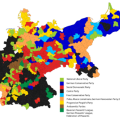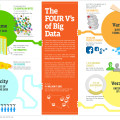Divya Schäfer writes:
am not a statistician, but a historian by training. However, I have a lay interest in election analyses, among other topics covered in your blog.
I live in Germany. Yesterday, the federal elections were concluded, as you may have heard. I was wondering if you could share your views on it on your blog?
A bit of background: Many of the results were expected, but some were surprising. Chancellor Merkel’s party was the largest, as expected. On the other hand, particularly unexpected was the extent to which the major parties were weakened and the strong performance of small parties, particularly the radical right-wing Alternative for Germany (AfD), which ended with 12.6%. It is strongest in eastern Germany. This is seen as a reaction to Merkel’s refugee policy, but probably has deeper roots.
Germany’s overall prosperity has also meant that the Left parties have found it difficult to push their message as strongly as they would have liked. According to some graphs they showed on TV yesterday, economic concerns like employment played a smaller role for voters than in previous elections. At the same time, there are many who feel left out. The German electoral landscape has changed, and analysts have offered various explanations for this. Is this speaking too soon? Maybe these elections represent only a blip rather than a rightward shift?
Germany has a proportional representation system, explained here.
Studies of German voting behaviour have been analysed in many scholarly works, which suggest both a generational effect as well as a life-cycle effect (sorry, I could not find English language resources for this). I think this has something to do with the proportional representation system. German voters change their choices from election to election more often than American voters, a phenomenon known as “Wählerwanderung”. This article (link here) from the Financial Times has some nice graphs on the German elections.
We see, for instance (based on fairly accurate exit polls), that the AfD has taken votes from all sorts of sources. Mostly it has mobilised non-voters, but has also taken substantial chunks from the CDU/CSU (Conservatives, also Merkel’s faction) and the SPD (Social Democrats). Even the Linke (Left Party) has lost as much as 11% of its voters to the radical right-wing party.
I have no idea; I know nothing about German politics beyond what I read in the newspapers. But it can be a good idea to blog on things I know nothing about. So feel free to comment, everyone!












Recent Comments